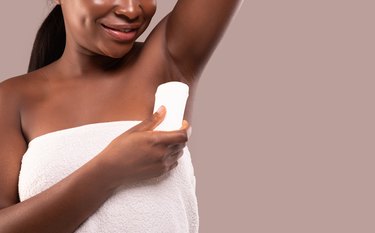
As we head into prime sweat season, it's time to take stock of your antiperspirant: Is it working for you?
One of the most common questions about antiperspirants is if using one can cause you to sweat more. The answer is a bit nuanced.
Video of the Day
Video of the Day
When it comes to your underarm sweat, the answer is no. "When applied correctly, antiperspirants should not make someone sweat more in that area," Lauren Eckert Ploch, MD, a board-certified dermatologist in Augusta, Georgia tells LIVESTRONG.com.
It is possible, however, that you may notice an uptick in sweating in other areas of your body, Dr. Ploch says. This is called "compensatory sweating."
"Someone who applies antiperspirant to the underarms may notice more sweating from other areas, such as the back and scalp," she says.
Still, compensatory sweating is less likely to happen as a result of antiperspirant use and more common with botulinum toxin (Botox) injections, an effective treatment for excessive underarm sweating.
If you notice that you're sweating more in other areas, see a board-certified dermatologist who can talk to you about effective ways to manage both underarm and compensatory sweating.
How Do Antiperspirants Work?
Antiperspirants are different from deodorants, and it's important to know which one you're using.
While deodorants mask body odor, "antiperspirants actually block the pores, or sweat ducts, in the underarms and stop sweat from reaching the surface," Lucy Chen, MD, board-certified dermatologist at Riverchase Dermatology in Miami tells LIVESTRONG.com.
Even if an antiperspirant wears off, you should still sweat your regular amount, not more.
"Usually, when applied correctly, antiperspirants can block a person's sweat for 24 to 48 hours. So, it's unlikely for antiperspirant to 'wear off' prior to another application unless it's not used in the right way," Dr. Chen says.
How to Apply Antiperspirants Correctly
Some tricks of the pit trade may help you stay sweat- and stink-free. "If you feel your antiperspirant is making you sweat more, it is likely that you are applying it incorrectly so that it cannot work to its full potential," Dr. Chen says.
1. Apply at Night
If it works with your schedule, shower at night, wash with a gentle non-residue soap and then completely dry skin, Dr. Chen says. After that, apply antiperspirant.
It takes time for antiperspirants to plug sweat glands, and nighttime application is preferable because "sweat glands are more easily blocked when they are not working extremely hard, like they are during the day," Dr. Chen says.
Tip
You can use a hair dryer on a cool setting to help dry your skin completely.
2. Repeat Every 24 Hours
Since antiperspirants are designed to block sweat for 24 hours, make sure you're applying it on time and regularly.
3. Don’t Apply When You're Already Sweating
It's natural to want to swipe on antiperspirant when you're already sweating, but this is the worst time to apply it.
"Many people continue to apply antiperspirants when they are sweating and will wonder why it's not helping," Dr. Chen says. "Aluminum — the active ingredient in antiperspirants — cannot penetrate water or sweat to reach sweat glands."
For best results, apply to clean, dry pits.
4. Get a Prescription
When your current antiperspirant isn't working, it may be time to trade up.
Talk to your dermatologist about a prescription antiperspirant, Dr. Chen says. Excessively sweating can be distressing, but it's common and can be managed with the help of a dermatologist, she adds.
Prescription antiperspirants can use different mechanisms for treatment. One example is targeting receptors on sweat glands to reduce their activity and therefore decreasing sweat production. You can try different products to find the one that works best for you.
Is this an emergency? If you are experiencing serious medical symptoms, please see the National Library of Medicine’s list of signs you need emergency medical attention or call 911.